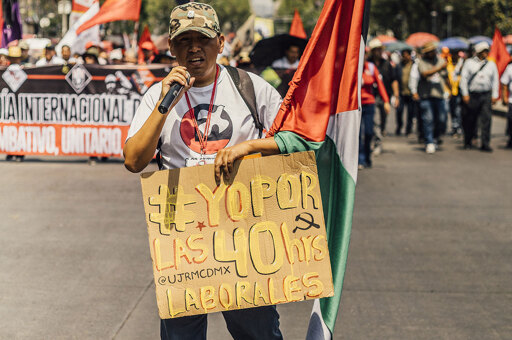This article by María del Pilar Martínez originally appeared in the November 2, 2025 edition of El Economista.
[Editor’s note: This represents a more business-oriented viewpoint of progress made to reduce the work-week to 40 hours from 48 hours, currently one of the longest workweeks on the planet, whereas critics from unions, workers groups and left wing parties have decried the slow progress of the reform, noting that it has not yet appeared on the legislative agenda in the Chamber of Deputies’ current sitting, despite more than a dozen ad hoc proposals to begin reducing the work-week being introduced by legislators, and that the tripartite consultations have been restricted and overly welcoming of business interests, who use the forums to attempt to blackmail the government into providing subsidies and other benefits or water down the reform. The Morena government, with its majority in the Senate and Chamber of Deputies, could legislate a reduction in the workweek immediately.]
The project to reduce the workweek from 48 to 40 hours continues to advance through a process based on social dialogue and the active participation of key stakeholders in the world of work. Unlike other recent reforms, this initiative has benefited from open and technical exchange between the business sector, unions, and government authorities, according to experts.
November is shaping up to be a pivotal month, as the federal government is expected to present its proposed reform to the Federal Labor Law. This reform will detail the implementation of the reduction of the workday in Mexico.

“Capital is dead labour, that, vampire-like, only lives by sucking living labour, and lives the more, the more labour it sucks. The time during which the labourer works, is the time during which the capitalist consumes the labour-power he has purchased of him. If the labourer consumes his disposable time for himself, he robs the capitalist.”
Over the past few months, significant progress has been made, allowing the process to move from conceptual debate to the operational design stage. “There is a growing consensus regarding the need to align Mexico with international trends toward shorter workdays and with the recommendations of multilateral organizations such as the International Labour Organization (ILO),” explained Germán de la Garza, managing partner of Fisher Phillips.
However, he said, the process is not yet complete. “Fundamental issues remain under analysis, such as differentiation by productive sector, mechanisms for gradual implementation, and the need to preserve conditions that favor the growth of formal employment and business competitiveness, particularly in micro, small, and medium-sized enterprises.”
While a preliminary version of the initiative may be available in November, this does not mean the dialogue is definitively closed, nor does it preclude further adjustments. The central objective is to arrive at a model that combines employee well-being with economic sustainability.
“The reform is no longer being discussed in terms of whether it should be done, but rather how to implement it. This is a significant step: today we have alignment among the main stakeholders, and the important thing will be to continue refining the regulatory content to achieve an orderly and successful transition to the new labor model,” Germán de la Garza noted.
The current process represents a historic opportunity for Mexico to move towards more modern international standards regarding working time, without losing sight of gradualism, rationality and the common interest.

In many Mexican cities, the crushing 48 hour work week is complimented by a 3 to 4 hour daily commute, meaning that corporations, primarily multinational, in Mexico monopolize between 66 and 72 hours of a worker’s life every week in pursuit of their superprofits. On top of this can be added the daily burden of reproductive labour, which is unpaid and disproportionately falls on women in households.
Two Years of Implementation
According to Representative Patricia Mercado, secretary of the Labor and Social Welfare Commission, before the end of this year “we will see the reform to the weekly working hours legislated; this does not mean that on January 1st we will already have 40 hours; but rather legislation that sets the path for the gradual implementation of what each person has to do to reach 40 hours. We propose two years of gradual implementation, as soon as possible.”
He emphasized that this is the most important priority in Congress for 2025; although he admitted that the labor agenda is here to stay and that in 2026 there is a long list of issues being developed for discussion.
Meanwhile, Humberto Huitrón, a consultant in Collective Labor Law, recalled that ILO Convention 1 regulated the 48-hour workweek in 1919. In 1935, that is, 90 years ago, the reduction of the workweek to 40 hours was defined. “In other words, Mexico is now experiencing the analysis and the urgency to begin implementing a reduction in the workweek 90 years after the ILO established it in its Convention.”
Six Structural Barriers Hinder Gender Equality in Mexican Workplaces
November 5, 2025
Equality is not a concession or a favor, it is an act of justice. As long as women’s work remains invisible, there will be no economic justice.
November is a Key Month for Work Week Reduction Reform
November 5, 2025November 5, 2025
90 years ago, the ILO defined the 40 hour workweek as an international standard. Mexico still has, in 2025, a 48 hour workweek, one of the longest in the world.
People’s Mañanera November 5
November 5, 2025
President Sheinbaum’s daily press conference, with comments on national water strategy, Michoacán Plan for Peace and Justice, sexual harassment, security with justice, astroturfed protests, & flood aid.
The post November is a Key Month for Work Week Reduction Reform appeared first on Mexico Solidarity Media.
From Mexico Solidarity Media via this RSS feed





